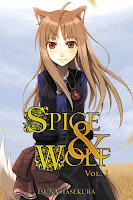 Author: Isuna Hasekura
Author: Isuna Hasekura
Illustrator: Jyuu Ayakura
Translator: Paul Starr
U.S. publisher: Yen Press
ISBN: 9780759531048
Released: December 2009
Original release: 2006
Awards: Dengeki Novel Prize
In 2005, Isuna Hasekura won the silver Dengeki Novel Prize, one of the most prominent awards given to light novels, for his debut novel Spice & Wolf. The book was subsequently published the following year with illustrations by Jyuu Ayakura. Spice & Wolf was generally well received—in Japan there are currently fifteen volumes and counting of the light novel series released and the story has been adapted into a manga series, an Internet radio show, an anime series, and at least one visual novel. Yen Press has licensed both the manga and the light novels for English publication. I don’t remember where I first heard about Spice & Wolf but the original light novel recently made its way into my hands.
Kraft Lawrence is twenty-five years old. He set out on his own as a traveling merchant seven years ago after working as an apprentice for six years. He’s fairly successful but still hasn’t been able to save enough to fulfill his dream of owning a permanently located shop of his own. The life of a traveling merchant is a lonely one; moving around from place to place is more conducive to developing good business acquaintances than any sort of true friends. But Lawrence’s life is bound to get a little less lonely and a lot more interesting when he discovers a girl with wolf ears and tail sleeping in the back of his wagon who turns out to be the incarnation of a local harvest god. Holo, suffering from loneliness herself, convinces Lawrence to allow her to travel with him and promises to increase his profits in return. It is a dangerous proposition, Holo could easily be mistaken for a demon by the Church and the two of them burned at the stake, but it’s a calculated risk that Lawrence is willing to take.
Spice & Wolf shows how interesting and cutthroat economics can be. Actually, I probably didn’t pay attention to the economics as much as I should have, especially considering how integral it is to Lawrence’s character as a traveling merchant and to the plot of Spice & Wolf as a whole. I really enjoyed the characters of Holo and Lawrence—he is charming and she is delightfully mischievous and their interactions and teasing are utterly adorable. I can’t say that I was surprised that the two of them ended up so attached to one another—I pretty much expected it to happen from the very beginning—but it does make me happy to see them together. I also really enjoyed Ayakura’s illustrations and character designs. The artwork isn’t particularly flashy, but it is sold and captures the feel of the characters nicely.
Paul Starr’s translation of Spice & Wolf is serviceable although occasionally awkward. Overall though, it is pretty good. Sometimes it seems as though important information and details have been left out, especially during sequences with heavy action, but I think this may have been the case in the original Japanese as well. As common with many light novels, Spice & Wolf is driven more by dialogue than it is by description. It’s a fairly straight-forward and uncomplicated story but the book is an enjoyable, light read. However, Lawrence and Holo do seem oddly omniscient of each other’s thoughts and feelings; I can understand a harvest god having this ability, but it seems strange to me that Lawrence, an ordinary human, should be so sensitive. Regardless, I’m looking forward to picking up the next volume of Spice & Wolf and continuing their adventures, economic and otherwise.

Speak Your Mind